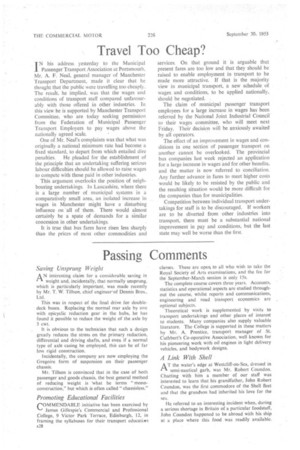Travel Too Cheap?
Page 30

If you've noticed an error in this article please click here to report it so we can fix it.
I N his address yesterday to the Municipal Passenger Transport Association at Portsmouth, Mr. A. F. Neal, general manager of Manchester Transport Department, made it clear that he thought that the public were travelling too cheaply. The result, he implied, was that the wages and conditions of transport stair compared unfavourably with those offered in other industries. In this view he is supported by Manchester Transport Committee, who are today seeking permission from the Federation of Municipal Passenger• Transport Employers to pay wages above the nationally agreed scale.
One of Mr. Neal's complaints was that what was originally a national minimum rate had become a fixed standard, to depart from which entailed dire penalties. He pleaded for the establishment of the principle that an undertaking suffering serious labour difficulties should be allowed to raise wages to compete with those paid in other industries.
This argument overlooks the position of neighbouring undertakings. In Lancashire, where there is a large number of municipal systems in a comparatively small area, an isolated increase in wages in Manchester might have a disturbing influence on all of them. There would almost certainly be a spate of demands for a similar concession in other undertakings.
It is true that bus fares have risen less sharply than the prices of most other commodities and services. On that ground it is arguable that present fares are too low and that they should be raised to enable employment in transport to be made more attractive. If that is the majority view in municipal transport, a new schedule of wages and conditions, to be applied nationally, should be negotiated.
The claim of municipal passenger transport employees for a large increase in wages has been referred by the National Joint Industrial Council to their wages committee, who will meet next Friday. Their decision will be anxiously awaited by all operators.
The effect of an improvement in wages and conditions in one section of passenger transport on another cannot be overlooked. The provincial bus companies last week rejected an application for a large increase in wages and for other benefits, and the matter is now referred to conciliation. Any further advance in fares to meet higher costs would be likely to be resisted by the public and the resulting situation would be more difficult for the companies than for municipalities.
Competition between individual transport undertakings for staff is to be discouraged. If workers are to be diverted from other industries into transport, there must be a substantial national improvement in pay and conditions, but the last state may well be worse than the first.




























































































